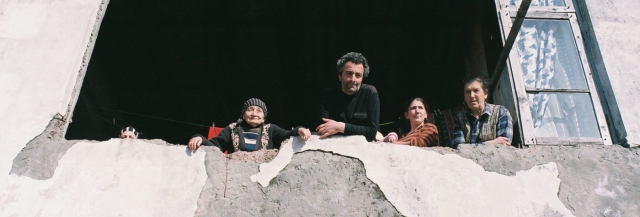Georgian PM presented homes for hundreds of internally displaced families
The Prime Minister of Georgia Mamuka Bakhtadze presented flats to 240 families of internally displaced persons (IDP) families in Zugdidi, a town in the western Samegrelo region.
Bakhtadze said in a speech during his visit to Zugdidi, “We will have the reason to celebrate when justice is restored and we return to the places where we deserve to be,” emphasizing the mixed emotions of the event.
Nearly 300,000 individuals are registered as IDP in the country of Georgia, with a total population of 3.7 million as of December 31, 2017. The Internal Displacement Monitoring Center repots these numbers, specifying no data was able to be collected on deaths of those registered as IDP, and only partial data is available on births within the community.
Despite the United Nations recognizing the right of return of internally displaced persons and refugees and their descendants to their homes in Georgia during a General Assembly meeting on June 1, 2017, the need to respect IDP communities has been ignored by occupied territories Abkhazia and the Tskhinvali region. The Assembly adopted a resolution stressing their property rights in conflict-affected areas of Georgia.
The return of internally displaced persons and refugees to their homes has been impeded by the closure of entry and exit points across the occupation line by the regime in Abkhazia.
The Prime Minister assured that 360 more families of internally displaced persons would receive new flats in 2019. Bakhtadze stressed the importance of the successful implementation of “House in Village” Project, working in combination with the Municipal Development Fund of Georgia and the German Credit Bank of Development.
According to Transparency International Georgia, the settlements in Zugdidi house by far the most internally displaced persons, and have struggled to provide adequately for over 4,000 IDP. According to surveys of settlements in Zugdidi reported in 2015, the main problems faced by collective centers and living communities for IDP there include an overall housing shortage and damaged buildings, citing issues such as dilapidated walls, floors, and roofs, and compromised water supply and sewage systems. These issues are compounded by high unemployment rates and the scarcity of land for people to cultivate to contribute to their livelihood.
In response to the plight of internally displaced people who have been resettled from their homes in occupied territories of Abkhazia and the Tskhinvali Region, the government continues to build and improve accommodations. From 2013 until September 2015, a total of GEL 2,425,569.41 was spent on renovation and construction of IDP accommodations through the state budget.
More specifically, in the town of Zugdidi, renovation of a pharmacy administration building created 74 apartments, a project that costed GEL 1,230,495.95; in addition, the German Reconstruction Credit Bank funded the construction of 8 residential buildings with over 250 apartments for a total of GEL 10 million.
Transparency International commends the efforts of the Georgian government and its supporters to provide for the refugees of occupied regions of the country. However, it cites a lack of oversight on renovation projects, stating, consequently, that most collective centers are still in need of renovation.
Further efforts should be invested in that empower internally displaced individuals have access to livelihoods and necessary social and medical infrastructure, such as education, employment, healthcare, and transport.
By Emily Sullivan
Photo Source: Concilation Resources












